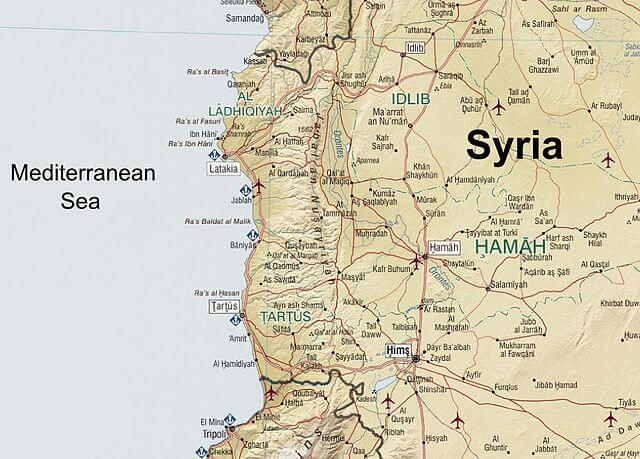 Everything you need to know about today’s coverage of Israel and the Mideast. Join the Israel Daily News Stream on Facebook.
Everything you need to know about today’s coverage of Israel and the Mideast. Join the Israel Daily News Stream on Facebook.
Today’s Top Stories
1. Professor Dave Petrasek (Globe & Mail op-ed) accuses Canada of selling out Syrian human rights to You Know Who’s interests:
It is deeply troubling that the Canadian government’s support for international justice initiatives in Syria (or elsewhere) might be held hostage to Israeli concerns about potential ICC investigations in the Palestinian territories.
2. Amir Taheri (NY Post) accuses Hezbollah of ethnic cleansing in areas of Syria vital for an Alawite mini-state:
Since September, Assad’s forces have been trying to expel those Sunnis, replacing them with Nusairiyah and Lebanese Shiite settlers. Hezbollah is giving a helping hand to that sinister scheme and paying the price.
Once the Sunni Muslim villages have been ethnically cleansed, Hezbollah would next have to move on villages such as Marmarita, Zeydal and Firuzah that are populated by Christians, as well as ethnic Turcoman villages opposed to Assad, notably Al-Samalil, Aqrab and Talaf.
Assad has embarked on a massive crime against humanity, with Hezbollah as his accomplice.

3. Baby Omar followup and fallout continues. HonestReporting’s Simon Plosker expands on the issue in a Times of Israel commentary. See more below.
Israel and the Palestinians
• The Lede takes a nice look at the revived controversy of Baby Omar’s death. I’m glad to see The Independent and Andrew Sullivan acknowledged the followup. So did a nice NY Daily News staff-ed. And the Washington Post discussed the matter with Ambassador Michael Oren. Referring to Hamas and Hezbollah, the ambassador said:
“You have to understand that the media is as much of a battlefield for them as anything going on” on the ground, he said. “You are dealing with terrorist organizations that will exploit and manipulate the media. They know how the Western press works and how to use it to their advantage.”
Both organizations, Oren said, use civilian deaths to turn public opinion against Israel, even if those deaths occur under ambiguous circumstances. This should make any news organization wary about attributing particular casualties.
• The fur flies in the UK as Douglas Murray calls on left-wing columnist Owen Jones to apologize for “big, sweeping incorrect allegations” about Israel, including the UN report exonerating the IDF for Omar Mishrawi’s death. Jones isn’t backing down.
• Nice Jerusalem Post analysis of President Obama’s Israel itinerary. Every stop has symbolic and/or substantive significance. If you prefer snark, check out Alistair Dawber’s evaluation in The Independent.
• A lot of broken quills, spilled ink, and dead pixels at today’s NY Times op-ed section. Professor Rashid Khalidi, Haaretz’s Ari Shavit, and columnist Tom Friedman weigh in on the peace process and President Obama’s trip.
Khalidi says years of peace efforts have entrenched “the occupation” while advancing the interests of other countries. Placing a lot of faith in the Arab Spring, Shavit says “New Peace” will quietly and pragmatically unfold as “the New Arabs and the New Israelis will acknowledge their mutual needs and interests.” Friedman addresses the low expectations for the president’s visit.
• Professor Avi Bell (Times of Israel) takes apart Professor Joseph Levine’s recent NY Times manifesto denying Israel’s right to exist.
• More Israel Apartheid Week drivel at the U. of Cape Town.
Iranian Atomic Urgency
• It’s not clear to Gerald Seib (Wall St. Journal, via Google News) that visiting President Obama will earn Israeli confidence.
• AP picked up on reports that Iran is blocking access to Western virtual private networks such as GMail, Yahoo, and Facebook.
• North Korea’s decision to go rogue on nukes should deter Iranian atomic ambitions. It’s the sanctions, stupid, argues Meir Javedanfar:
One of the most important factors which could bring Iran’s leader, Ayatollah Ali Khamenei, to such a conclusion is the fact that developing and testing nuclear weapons has not removed or reduced sanctions against the North Korean regime. In fact, these actions have brought additional sanctions.
The same would almost undoubtedly happen if Iran finally decides to build a nuclear weapon.
Although the North Korean regime may be able to withstand open-ended sanctions and isolation, the same cannot be said about Iran, which is much more sensitive to sanctions.
Arab Spring Winter
• For your Calvinball in Cairo files:
- Court to rule on dissolution of Muslim Brotherhood (via Daled Amos)
- Citizen’s arrest powers provoke strong debate (via Elder of Ziyon)
• One day before its opening, Egypt banned a film documentary about the history of its Jewish community.
• Reuters picked up on a damning Save the Children report on the status of kids in Syria.
• Michael Jansen of the Irish Times takes a sadly shallow look at Hezbollah, talking to its spin doctor emeritus, Ibrahim Moussawi.
• Will Lebanon Be Held Accountable for Its Pro-Assad Bias?
(Syria map via Wikimedia Commons, NY Times logo via Fickr/guano)
For more, see yesterday’s Israel Daily News Stream.

